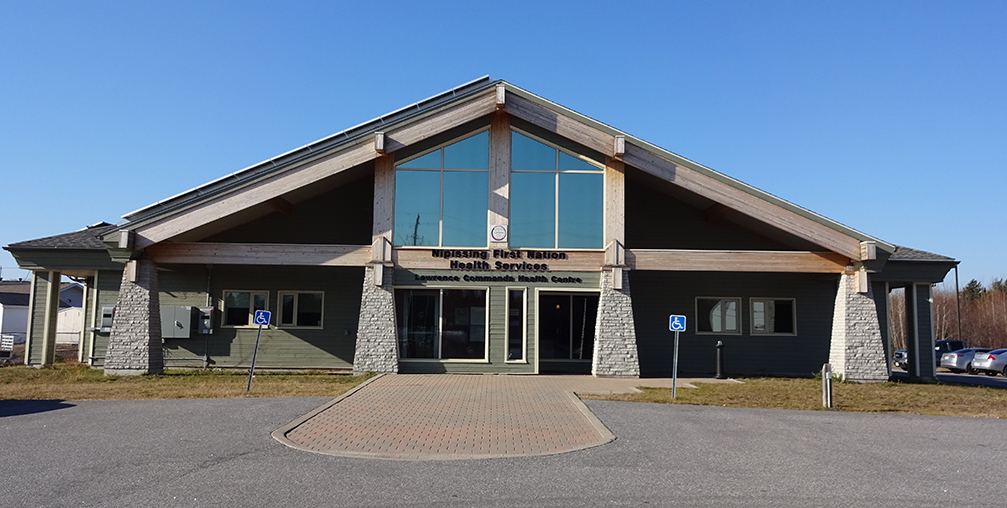Nipissing partners on new Indigenous primary care team

Interprofessional team will serve North Bay and three local First Nations
GARDEN VILLAGE, ON – Nipissing First Nation has partnered with Dokis and Temagami First Nations, and the North Bay Indigenous Friendship Centre to create the North Bay Indigenous Interprofessional Primary Care Team (IIPCT). The North Bay IICPT is slated to receive new health funding announced by the Ministry of Health and Long Term Care.
“The North Bay IIPCT is a community-driven and Indigenous-governed organization that includes members of multiple professions working collaboratively to provide holistic, accessible and culturally safe care,” explains Kimberly Lalonde, Director of Health Services for Nipissing First Nation. The team will serve the Indigenous population within the traditional territories of the Dokis, Nipissing and Temagami First Nations.
“There is a long-standing gap in this type and level of service for this area,” says Chief Scott McLeod. “The opportunity to offer Indigenous-led primary care services is a significant and necessary step to address health inequities experienced by First Nation, Inuit and Métis people.”
Indigenous people have experienced cultural and historical traumas that have had lasting, intergenerational effects – colonialism, racism, loss of language and cultural identity through residential schools, the ‘60’s scoop’ and child welfare systems. The North Bay IICPT will help bridge the current gaps in health care in our region by providing comprehensive and culturally-safe services to improve long term outcomes for wellness.
When the Ministry of Health and Long-Term Care announced in June 2017 that an Expression of Interest process was open to organizations wanting to create or expand Indigenous primary care teams, a planning group was quickly established and submitted an application in mid-August. The group included leaders from the three First Nations and the North Bay Indigenous Friendship Centre.
Until now, Nipissing, Dokis and Temagami First Nations’ Health Centres have been federally funded and mandated to provide public/community health care. They were not resourced to offer primary care services similar to those offered in other communities until the recent funding announcement.
“Relationship-building has been critical to developing this team to serve our local First Nations, as well as the urban Indigenous population through the North Bay Indigenous Friendship Centre,” adds Ms. Lalonde. “Increasing access to Indigenous-led and governed health services promotes self-determination and a level of deconstruction of the colonial impacts represented today in the poorer health status and health inequities for Indigenous peoples over the life span.”
The North Bay IICPT will provide: traditional and community healing services; health assessments, diagnosis and treatment; primary reproductive care, access to pre- and post-natal care and obstetrical care; primary mental health care; primary palliative care; service coordination and referral, including home and community care coordination; telemedicine services; health promotion and disease prevention; and chronic disease management programs, including diabetes, asthma, mental health and addiction services.
Board Structure and Service Delivery
The North Bay Indigenous Interprofessional Primary Care Team (IIPCT) will be Indigenous-led with a Board of Directors responsible for providing governance and oversight. The Board will be the employer and funding recipient for the North Bay IIPCT. It is expected that over 15 positions will be created through the IIPCT.
The incorporated Board will be designed to ensure comprehensive oversight inclusive of technical health expertise, traditional health knowledge and the voice of community.
Community representation on the Board will be supplemented by community consultations to inform the development of the North Bay IICPT. To ensure all life stages are considered, children, youth, adults and Elders will be involved in the consultative process. Board membership is rooted at the local level and responsive both to the population served and the local health systems in which the North Bay IIPCT must manage.
Quick Facts
- The Indigenous population represents 11% of the total population in Northeastern Ontario: nelhin.on.ca/aboriginalhealthservices.aspx
- The Indigenous population is young. Statistics Canada’s 2011 National Household Survey notes that
28% of the Indigenous population is 14 years of age and under, 18.2% are ages 15-24; and only 6% are aged 65 years and over. This is in keeping with a report by the Health Director at Temagami First Nation that approximately 50% of the current on-reserve population is under the age of 25 years. - The Indigenous population has higher rates for risk factors and chronic disease when compared to non-Indigenous people in the province, according to the Health Status Profile and Environmental Scan, Aboriginal, First Nations and Metis prepared for the NE LHIN in March 2011.
- Nipissing, Dokis and Temagami First Nations successfully transitioned to transfer arrangements with the First Nations and Inuit Health Branch – Ontario Region (1997) as a result of collective work that commenced in 1994. With the opportunity for Indigenous Primary Care in this area, the partnership was strengthened and the engagement of the North Bay Indigenous Friendship Centre was a natural part of the process.
About Nipissing First Nation – Our mission is to continue to protect our Nation’s inherent rights and to empower the membership to work together in a positive, progressive manner to improve well-being and quality of life, to be socially and economically independent, culturally strong and self-governing.
About Nipissing First Nation Health Services – The Health Services department strives to offer a comprehensive community health program that incorporates increased mindfulness of cultural and traditional approaches to wellness while embracing innovative ways of delivering services. Relationship-building among the many partners in health now includes discussion and consideration

